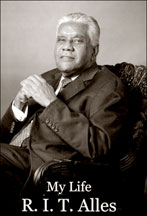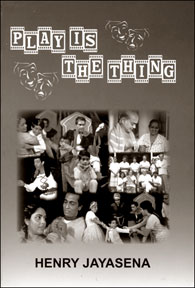
Harnessing the 'negatives' into 'positives'
My Life - R.I.T Alles:
Reviewed by Aditha Dissanayake
As I reached the last page of 'My Life' by R.I.T Alles my heart sank
with apprehension. I knew deep down within me that here is a book that
has to be read, and not written about.
 Especially because the two-hundred-and-sixty seven pages,
encompassing an interesting array of photographs, provide a breathless
difficult-to-put-down, kind of read. Especially because the two-hundred-and-sixty seven pages,
encompassing an interesting array of photographs, provide a breathless
difficult-to-put-down, kind of read.
The only other autobiography I found as fascinating as "My Life' is
Mark Twain's. But whereas Twain concludes his book with the
disconcerting phrase that this is his life story and "some of it is
true" the author of "My Life" records almost every detail of his journey
from the day of his birth to his seventy-fifth birthday, with such
honesty that it gives hope even to those who dare not hope any more.
When he writes on the last page "nothing has come easy to me',
everybody who has already read the first page would know how true this
statement is. "I was born a month premature and it was with great
difficulty that I survived." he records on page one.
"One of my uncles, Dr. Reggie Alles had instructed that the baby
would survive only if properly suckled.
This was beyond a premature baby all blue and weak. So my mother had
taken a piece of cloth, turned it into a wick and had dipped it in milk
and placed it in my mouth as if feeding a baby squirrel. She was
overjoyed when the baby responded.
This is how I survived my first challenge in life." More would follow
as he grew older but in spite of the hardships he recalls the days he
spent in Akmeemana, were the best part of his childhood.
"It was a life full of hardship, yet there was the love of a darling
mother. I remember I had to go to school sometimes without socks and
shoes, and I had to walk five and a half miles! I had to leave home
quite early. The bond between my mother and me was very strong.
I remember I used to scrape coconut and mother used to make "rotti".
It was a very affectionate relationship. We had no beds. We used to
sleep on mats. We had to be mindful of the fact that we had to look for
other sources of income. So we reared poultry, and yearned for the hens
to lay, as our lives depended on the income it brought."
As he continues, the authenticity of his narration becomes evident
due to the disorganized narrative structure. Often a statement is
repeated twice or thrice, but with such ingenuity that it never becomes
tedious.
The fourth paragraph on page three begins describing the bond between
the writer and his mother, in much the same way it does in paragraph
two. "When I look back, the life that I led was very challenging yet
enjoyable.
I always had the comfort of my mother's bosom..." Then, the abrupt
description of the custom of celebrating the "aluth batha", which comes
without the connecting props as it often does in day to day speech,
transcends the words on the page into a voice.
The description becomes real so real that it brings tears to the eye.
"In our villages there is a custom of the "first meal" after the
harvest. We did not own a paddy-field but there was one that belonged to
Banda Ralahamy.
When paddy was harvested, sheaves of paddy sometime fell by, which
were forgotten by the harvesters, and little children were allowed to
collect those sheaves that fell by the fields. I remember collecting
these sheaves which were used to make our "Aluth Batha" and we had our
first meal..." Yet, there is also the occasional phrase, found in
typical rags to riches stories
" Sometimes our troubles were so great I used to study under a street
lamp because we were short of kerosene oil".
Balancing the tragic with occasional episodes of hilarity he writes
of how he overcame the difficulties of his courtship with Rohini,
waylaying her brother, ASP (CID) Harold whose surveillance bogey by
bogey before dispatching his sister to Galle on the Ruhunu Kumari proves
to be futile.
He is also proud to be a member of the GPS while he was at the
Teacher Training College at Maharagama. GPS stood for Gas Palukarana
Samithiya.
The role the author has played as an educator takes up the better
half of the book. Yet, here too, the narrative is such that even those
who have nothing to do in the arena of education will hardly ever find
the reading exhaustive. Consider the chapter titled State Secretary of
Education where the secret behind the incomprehensible delays in the
government service is revealed.
When a file comes to the department it is given one of the following
labels. 'Ah ka sa' which stands for "awashya katayuthu sandaha, and
which is send to a senior officer, wa ka (wartha karanna), send to a
subordinator and "ni ke" (nirdesha karanna) send to the secretary. Thus
thanks to these delaying tactics, the things that can be done in a few
minutes go from hand to hand.
His contributions as a principal is best summed in the article
reproduced on the back cover from the Sunday Observer of November 30,
1980. Comparing him with great principals like Blaze, Frazer, Hartley,
the editor writes "Schools are made or broken by principals and teachers
and the support they can muster.
We hope this example of an active and devoted Principal will inspire
discouraged principals...who have to cope with seemingly intractable
problems." From the story behind the scar on his forehead to being a
"terror' at Royal College, a terror who nevertheless invited his entire
class to his wedding, the book paints an unforgettable portrait of an
extraordinarily complete and rounded figure.
This is it. I am rapidly running out of space. Now that you have had
a glimpse of how interesting the book is (believe me I picked up only
the most 'boring' bits lest I spoil your appetite) it is high time I
stopped writing and leave you to start reading.
Bet you a month's salary you will not put the book down once you
begin. But is it not wrong to bet? No, you will be all right if you bet
on a horse and get a "winning treble in ten" and use it properly (p 14).
Who knows you might end up writing a similar autobiography.
High drama
Kisses and tears at the launch of "The Play is the
Thing":
 Kisses and tears flew freely at the launch of Henry Jayasena's latest
(and which he insists against everybody's protests is his last) book
"The Play is the Thing" on Monday. Kisses and tears flew freely at the launch of Henry Jayasena's latest
(and which he insists against everybody's protests is his last) book
"The Play is the Thing" on Monday.
He lavishly bestowed kisses on everyone, (me included) much to the
amused chagrin of Irangani Serasinghe, his one time co-star in Doo
Daruwo. When she teased him for not having given up kissing at his age,
he laughed and assured her he will be kissing her too, in a minute.
Yet, amidst the laughter, the warmth and the sense of overwhelming
comraderie that prevailed on the evening of the 4th, at the Auditorium
of the National Library, there were also moments of unbearable grief.
Everyone missed Manel Jayasena. There was hardly a dry eye in the
audience when Henry Jayasena broke down while making his speech, saying
the moment would have been perfect had Manel too been there with him.
His tribute to Sudharaka was equally moving. Sylvia, the lady seated
directly in front of me who made my day by saying she reads all the
articles I write, openly wept into her handkerchief.
Tears glistened in Anoma Jayasena's eyes too, as she walked up to the
stage to receive the book from her father in law, together with
Sudharaka and her two sons.
In an era when children leave their nests to roost in lands where the
pastures are greener, Henry Jayasena felt Sudharaka deserves his deep
gratitude for deciding to remain in his motherland to be close to his
father. If Sudharaka too had left like the others, prophesied his
father, "I would have been living in a Home for the Elders today".
As if to prove Manel Jayasena was there in spirit, smiling benignly
on everybody present, the tears failed to dampen the day, which Henry
Jayasena called is a historical one. Historical? Why? Was this the day
Hunuwateye Kathawa was first staged? Was this his birthday? While I
cracked my brains trying to figure why the day was historical he came
out with a totally unexpected answer.
Praising Vijitha Yapa for choosing a day like this to launch his
book, he solved the mystery by saying this was a historical day because
Muttiah Muralitharan broke the record held by Shane Warne for holding
the highest number of wickets in test matches.
Vijitha Yapa too with his characteristic wit, introduced Henry
Jayasena by saying there are two kinds of icons. The I-cons, meaning
politicians, and the (real) icons. Henry Jayasena, needless to say,
belongs to the latter.
The same motif was evident in Tissa Jayatilaka's key note address
where he stated Henry Jayasena is his hero and he found his task an
extremely difficult one for he feared he might say too much and blow his
hero up, or say too little and present him as a pseudo hero.
He got round this obstacle, however, by quoting from the book, and
kept the audience enthraled with the lucid prose describing various
events of the life of the icon who Tissa Devendra, in his article last
week on Writer's Den described as a National Treasure.
Behind every writer in English, in Sri Lanka there is one person. Dr.
Lakshmi de Silva. "If not for Lakshmi this would not have been possible.
She was the one who pushed me into this" said Henry Jayasena, to which
she replied that she felt these series of articles aptly showcase how
the theatre evolved in our country, capturing the spirit of the early
sixties for posterity.
It was apt that the event came to an end with a quote from the final
few pages of the book in which the author asks "Will there not be
someone someday/on these paths/some future day/Enlightened by your
efforts,/my courageous Ones?"
Yes, there will be many. (Me included)
Aditha
[email protected]
An English reader with a difference
by Upali Pannila
 The shocking levels to which the teaching of English has fallen in
our country were clearly shown when 63% of students failed in English
Language at the G.C.E. O/L examination held last December. The shocking levels to which the teaching of English has fallen in
our country were clearly shown when 63% of students failed in English
Language at the G.C.E. O/L examination held last December.
This is a serious state of affairs and a matter of concern not only
for parents and teachers but also for the country in general. The
tragedy is that most of them had studied English at school for about 8
years.
In an era when the countries of the world are seeking closer ties
regionally and globally for economic activity and educational and
cultural exchanges, no country can remain in isolation.
In this scenario, for the sake of their personal development and the
development of the country, it is imperative that our children be given
a good command of English which has become the Lingua Franca of the
emerging world order. When the advantages that a good knowledge of
English offers are so immense, it is tragic that we have neglected the
teaching of this vital langauge.
It is well-known that the vast majority of our students who complete
O/L and A/L examinations cannot compose correctly a few sentences in
English. This is especially true of rural students who form 90% of our
student population.
The failure is not due to any lack of intelligence of our rural
students. It is because teaching methods used and the textbooks
prescribed do not address the specific problems Sinhala and Tamil
students encounter in learning English. It is also well-known that the
teachers of English with their mediocre English have aggravated the
situation further.
It is in the light of this background that I see Dr. Antony
Fernando's "Good English for a Good Future" as an English Reader and
Grammar with a difference.
In the Foreword to the book Dr. Fernando states that the book is an
outcome of long-term research conducted with the aim of making English
an actually used second language of vernacular educated Sri Lankans.
He adopts a novel method called the Mother-Tongue Comparative Method
to present the structural elements of English in comparison with Sinhala
and Tamil. This Comparative Method, according to Dr. Fernando, helps
students assimilate easily and fast the basics of the language and start
conversing correctly and confidently in English.
He further states that once students achieve basic conversational
ability, the Comparative Method should give away to the English through
English method.
"Good English for a Good Future" has been methodically planned for
effective use as a Supplementary Reader and Grammar of GCE O/L students.
Each of the 15 chapters in it consists of two vital parts, a reading
text and a grammar lesson. The reading passages in the book, woven
around an English Speaking Club of a rural school, are structurally
controlled and are easy to comprehend.
One other salient feature of the book is the importance given to good
handwriting, which unfortunately is generally neglected in our schools.
There are exercises that train students in cursive writing and the use
of block letters and capital letters.
In "Good English for a Good Future", Dr. Fernando clearly shows his
in-depth understanding of the problems Sinhala and Tamil students face
in learning English and the remedial measures he has found through years
of research to help students clear the initial hurdles they face when
coming to grips with a foreign language.
The author has amply justified the age-old adage. "To teach Latin to
Peter one must know not only Latin, but also Peter", which means, to
teach English to Sri Lankans, one must know not only English but also
the Sri Lankan mind. This is a book that should be in the hands of not
only practising teachers of English, but also of trainers of English
teachers. |
